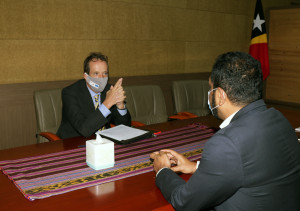Government and European Union analyze cooperation partnership in the country

The Minister of the Presidency of the Council of Ministers, Fidelis Leite Magalhães, met today, June 9, 2020, with the Ambassador of the European Union (EU) in Timor-Leste, Andrew Jacobs, to identify the priority areas for the Government, to be included in the first draft of the new cooperation agreement between the EU and Timor-Leste, which should be finalized by the end of the year.
During the meeting, the diplomat addressed the various existing areas of cooperation and expressed the EU's willingness to support Timor-Leste in new sectors, in accordance with the Government’s priorities, as well as to contribute to attracting European investors to the national market and new projects and programs promoted by other Member States, in addition to those already present in Timor-Leste.
The areas of cooperation addressed include support for economic development, access to credit, private sector development, Timor-Leste's accession process to ASEAN, tourism development, the agroforestry sector, the fight against climate change, conservation of natural resources, institutional strengthening, and decentralization.
Fidelis Leite Magalhães stressed the importance of Timor-Leste's relationship with Europe, the historical connection and the large number of Timorese citizens residing in European countries.
Regarding cooperation with the EU, the Minister highlighted measures that contribute to the well-being and improvement of the quality of life of the population, job creation and the eradication of poverty. He further highlighted economic development, without jeopardizing the environment, to ensure sustainability, with investment in the tourism, fisheries, industrial and agroforestry sectors.
The Minister also discussed the need for investment in institutional development, with more human resources training, so as to improve their technical capacities, and as such be able to consolidate the ongoing institutional reforms.










































